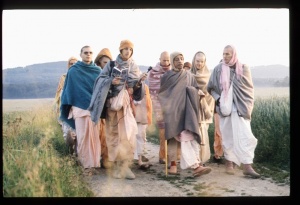CC Antya 3.257 (1975)

A.C. Bhaktivedanta Swami Prabhupada
TEXT 257
- mukti-hetuka tāraka haya 'rāma-nāma'
- 'kṛṣṇa-nāma' pāraka hañā kare prema-dāna
SYNONYMS
mukti-hetuka—the cause of liberation; tāraka—deliverer; haya—is; rāma-nāma—the holy name of Lord Rāma; kṛṣṇa-nāma—the holy name of Lord Kṛṣṇa; pāraka—that which gets one to the other side of the ocean of nescience; hañā—being; kare—gives; prema-dāna—the gift of love of Kṛṣṇa.
TRANSLATION
"The holy name of Lord Rāma certainly gives liberation, but the holy name of Kṛṣṇa transports one to the other side of the ocean of nescience and at last gives one ecstatic love of Kṛṣṇa.
PURPORT
In an indirect way, this verse explains the chanting of the Hare Kṛṣṇa mahā-mantra. The Hare Kṛṣṇa mahā-mantra-Hare Kṛṣṇa, Hare Kṛṣṇa, Kṛṣṇa Kṛṣṇa, Hare Hare Hare Rāma, Hare Rāma, Rāma Rāma, Hare Hare-includes both the holy name of Lord Kṛṣṇa and the name of Lord Rāma. Lord Rāma gives one the opportunity to be liberated, but simply by liberation one does not get actual spiritual benefit. Sometimes if one is liberated from the material world but has no shelter at the lotus feet of Kṛṣṇa, one falls down to the material world again. Liberation is like a state of convalescence, in which one is free from a fever but is still not healthy. Even in the stage of convalescence, if one is not very careful, one may have a relapse. Similarly, liberation does not offer as much security as the shelter of the lotus feet of Kṛṣṇa. It is stated in the śāstra:
- ye 'nye 'ravindākṣa vimukta-māninas
- tvayy asta-bhāvād aviśuddha-buddhayaḥ
- āruhya kṛcchreṇa paraṁ padaṁ tataḥ
- patanty adho 'nādṛta-yuṣmad-aṅghrayaḥ
"O Lord, the intelligence of those who think themselves liberated but who have no devotion is impure. Even though they rise to the highest point of liberation by dint of severe penances and austerities, they are sure to fall down again into material existence, for they do not take shelter at Your lotus feet." (10.2.32) Yuṣmad-aṅghrayaḥ refers to the lotus feet of Kṛṣṇa. If one does not take shelter of Kṛṣṇa's lotus feet, he falls down (patanty adhaḥ), even from liberation. The Hare Kṛṣṇa mahā-mantra, however, gives liberation and at the same time offers shelter at the lotus feet of Kṛṣṇa. If one takes shelter at the lotus feet of Kṛṣṇa after liberation, he develops his dormant ecstatic love for Kṛṣṇa. That is the highest perfection of life.